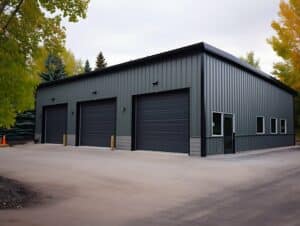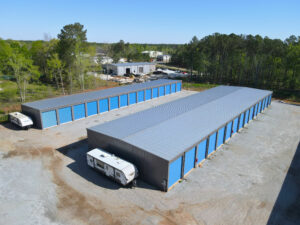In recent years, the popularity of recreational vehicles (RVs) has soared, with more people opting for the freedom and flexibility they provide. However, as RV ownership increases, so does the need for suitable and secure storage buildings.
Over the last five years, 263.2 million square feet of storage space was added in the US, reflecting a significant growth in supply to meet the rising demand.
Also, there are nearly 2,000 dedicated RV and boat storage properties, with more than 13,000 self-storage properties offering RV storage options.
The importance of proper storage cannot be overstated—it ensures the longevity of your RV and keeps it safe from the elements and potential theft.
In this article, we will delve into the world of RV storage building solutions, focusing on maximizing a secure space.
Table of Contents
- Understanding the Importance of RV Storage
- Exploring Different RV Storage Building Solutions
- Enhancing Security in Your RV Storage
- Maintaining Your RV Storage Building
- Conclusion
- Frequently Asked Questions
Understanding the Importance of RV Storage
When it comes to RV storage, two crucial factors come to mind—space and security (have a secure location). Let’s explore why these aspects are vital for any RV owner.
RVs are known for their spacious interiors, providing a comfortable and convenient way to travel and explore.
However, finding adequate space for storage when not in use can be challenging. Without proper storage, your RV may take up valuable driveway or street space, causing inconvenience and potentially violating local regulations.
Furthermore, leaving your vehicle exposed to the elements can result in damage to its exterior and interior components, leading to expensive repairs.
But space is not the only concern. Security is equally important when it comes to RV storage. RVs are valuable investments and can be tempting targets for thieves. Therefore, ensuring your RV has a secure storage space for customers is of utmost importance.
By choosing a secure storage facility, you can have peace of mind knowing that your RV is protected from potential theft and vandalism.
Check out: What Zoning Is Needed For RV Storage?
The Need for Space and Security in RV Storage
RV owners understand the value of having ample space for storage. Whether it’s storing camping gear, outdoor equipment, or personal belongings, having a dedicated storage space for your RV allows you to keep everything organized and easily accessible.
Additionally, it frees up valuable space at your home, allowing you to utilize your driveway or street for other purposes.
When it comes to security, RV owners want to ensure that their investment is well-protected.
By choosing a storage facility with robust security measures, such as CCTV surveillance, access control systems, and individual unit alarms, you can minimize the risk of theft and unauthorized access.
These security features act as a deterrent to potential thieves and provide you with the confidence that your RV is in safe hands.
Key Factors to Consider in RV Storage Solutions
When evaluating RV storage solutions, several crucial factors come into play:
- Location: Consider the proximity of the storage facility to your home and travel routes. Convenience and accessibility are vital. Having a storage facility that is conveniently located can save you time and effort when it comes to retrieving or dropping off your RV.
- Weather Protection: Look for storage options that safeguard your RV from harsh weather conditions, such as extreme temperatures, rain, snow, and UV rays. A storage facility with covered or indoor storage options can provide the necessary protection to keep your RV in optimal condition.
- Security Measures: Evaluate the security features offered by the storage facility, including CCTV surveillance, access control systems, and individual unit alarms. Additionally, inquire about the facility’s security protocols and staff presence to ensure that your RV is in a secure environment.
- Amenities: Check for amenities like wash stations, dump stations, and electrical hookups that can make storage and maintenance more convenient. These amenities can save you time and effort by providing on-site facilities for cleaning, waste disposal, and power supply.
- Cost: While cost is a consideration, prioritize quality and security over the lowest price. Investing in a reputable and secure storage facility may come at a slightly higher cost, but it ensures the safety and well-being of your RV in the long run.
By considering these key factors, you can make an informed decision when choosing an RV storage solution that meets your needs and provides the necessary space and security for your valuable investment.
Did You Know?
The average price per acre for RV storage properties rose to $661,000 in 2022, reflecting a 53.6% year-over-year increase. This trend is driven by rising demand and limited supply.
Exploring Different RV Storage Building Solutions
RV storage buildings come in various forms, each catering to different needs and preferences. Let’s examine three popular options: indoor, outdoor, and covered RV storage buildings.
Indoor RV Storage
Indoor RV storage offers the highest level of protection against the elements and theft. These buildings are typically large, enclosed structures with climate control capabilities.
The indoor storage facilities are designed to shield your RV from extreme temperatures, direct sunlight, and other weather-related risks.
Imagine walking into one of these impressive structures and being greeted by rows upon rows of well-maintained RVs, neatly parked and protected.
The climate control system ensures that the temperature and humidity levels are optimal, preventing any damage that could occur due to extreme weather conditions.
Moreover, the heightened security measures implemented in these facilities provide peace of mind. From surveillance cameras to access control systems, every aspect of security is meticulously planned.
The thought of leaving your RV in such a secure environment allows you to focus on other aspects of your life, knowing that it is well-protected.
Outdoor RV Storage
Outdoor RV storage buildings, also known as open-air storage, are cost-effective options for those with tighter budgets. These facilities consist of parking lots or designated areas where RVs are stored in the open.
While outdoor storage buildings lack the protection of indoor options, they still provide a convenient and secure space for your RV.
Many outdoor storage facilities employ security measures such as fencing, video surveillance, and secure access to ensure your RV’s safety.
Picture a well-maintained outdoor storage facility with ample space for RVs of all sizes. The open-air environment allows for easy maneuvering of your vehicle, making it hassle-free to park and retrieve your RV whenever you need it.
The security measures in place give you peace of mind, knowing that your prized possession is being watched over.
Covered RV Storage
Covered RV storage buildings offer a balance between indoor and outdoor storage. These buildings provide overhead coverage, protecting your RV from direct sunlight and minimal weather elements like rain and snow.
They typically feature roofs and open sides, allowing for natural ventilation and preventing moisture accumulation.
Imagine driving into a covered RV storage building and seeing a row of vehicles safely sheltered from the elements. The overhead coverage provides an added layer of protection, shielding your RV from the harmful effects of prolonged exposure to sunlight.
The open sides allow for natural airflow, preventing any musty odors that can occur in fully enclosed spaces. Covered storage is a popular choice for those seeking an affordable yet protected storage option.
Whether you opt for indoor, outdoor, or covered RV storage, each option has its unique advantages.
Consider your budget, the level of protection you desire, and the convenience factor when making your decision.
With the right storage solution, you can ensure that your RV remains in top condition, ready for your next adventure.
Pro tip:
When setting up an RV storage building solution, consider offering amenities like wash stations, electrical hookups, and dump stations. These services can attract more customers and provide additional revenue streams
Enhancing Security in Your RV Storage
Alongside efficient space utilization, ensuring the utmost security for your RV is crucial. Here are some essential security features to consider:
Essential Security Features
1. Perimeter fencing: Look for facilities with sturdy perimeter fencing to deter unauthorized access.
2. Video surveillance: Opt for storage facilities equipped with surveillance cameras to monitor and record activities.
3. Access control systems: Facilities with electronic access control systems, such as keypad entry or proximity cards, provide an added layer of security.
Advanced Security Measures for Optimal Protection
1. Individual unit alarms: Consider storage facilities that offer individual unit alarms, alerting you and facility staff in case of unauthorized entry.
2. Security personnel: Facilities with on-site security personnel provide an additional level of security and peace of mind.
3. Motion-activated lighting: Well-lit storage areas discourage potential thieves and ensure easy navigation during evening visits.

Maintaining Your RV Storage Building
To ensure the longevity of your RV storage building, regular maintenance is essential. Here are some tips:
Regular Maintenance Tips
1. Clear snow and debris: If opting for outdoor storage, regularly remove snow accumulation and debris from the RV’s roof and exterior to prevent damage.
2. Check for leaks: Inspect the storage building for any signs of leaks or water damage, ensuring the interior remains dry.
3. Pest control: Take preventive measures to keep pests away from the storage building and your RV. Seal any entry points and consider using approved pest control methods.
Dealing with Common RV Storage Issues
1. Tire care: Properly inflate your RV’s tires and consider using tire covers to protect them from UV damage.
2. Battery maintenance: Either remove the battery or keep it connected to a battery maintainer to ensure its optimal performance during storage.
3. Ventilation: Ensure proper ventilation within the storage building to prevent the buildup of moisture and avoid potential mold or mildew issues.
Conclusion
Finding the right RV storage building solution is vital for maximizing space and ensuring the security of your recreational vehicle.
By understanding the importance of space and security, exploring various storage options, and implementing efficient space utilization techniques and security measures, you can safeguard your RV and enjoy peace of mind during storage.
Regular maintenance and addressing common storage issues are also integral to preserving your RV and prolonging the lifespan of your storage building.
With the right storage solution in place, you can protect your valuable investment and continue embarking on memorable RV adventures for years to come.
SteelCo has over 23 years of experience in dropshipping PEMB materials for storage building solutions and boasts a combined team industry experience of over 100 years.
Our expertise allows us to provide assistance with initial basic designs, stamped engineering plans, and project support for timeline coordination.
We can offer assistance with obtaining necessary building permits, zoning, and local ordinances. Learn more about our prefabricated storage buildings.
———————
Frequently Asked Questions
How should I price RV storage units?
Storage prices for RVs are influenced by location, with urban areas generally presenting higher rates due to elevated real estate costs and demand. Indoor storage, offering the greatest security and protection, costs more compared to covered storage, which provides some protection against the elements.
The most budget-friendly option is outdoor storage. It is an affordable choice for those seeking economical solutions.
What are the standard sizes for RV storage units?
RV storage units come in various sizes to accommodate different types of recreational vehicles. Common sizes include small spaces like 10’ x 20’ and 10’ x 25’, which are suitable for smaller RVs such as pop-up campers, travel trailers, and Class B motorhomes.
Medium-sized units, such as 10’ x 30’, can fit larger vehicles like Class A motorhomes or longer trailers.
How much does it typically cost to build an RV storage facility?
The cost to build an RV storage facility can vary widely depending on several factors, including location, size, and the type of storage provided. Generally, you could spend around $10,000+ for a basic facility. However, more comprehensive facilities with amenities like climate control, security systems, and covered storage can cost significantly more.
What are the zoning requirements?
Zoning requirements for building an RV storage facility can vary significantly depending on the location. Generally, RV storage facilities are typically permitted in areas zoned for Commercial or Industrial use. These zones are designated for business activities and industrial operations, which often include storage facilities.
What insurance considerations should I keep in mind?
When operating an RV storage business, it’s essential to have comprehensive insurance coverage to protect your business, customers, and assets. Key insurance types include General Liability Insurance for bodily injury and property damage claims, Property Insurance for physical assets, and Customer Goods Legal Liability to cover damage or loss of customers’ RVs.
Additionally, Garage-Keeper’s Liability is important if you offer services like moving or maintaining RVs, and Pollution Liability is necessary if there’s a risk of hazardous material leaks.
Other important coverages include Business Income Insurance, which provides for lost income if operations are interrupted, and Cyber Liability Insurance to protect against data breaches and cyber-attacks.
























